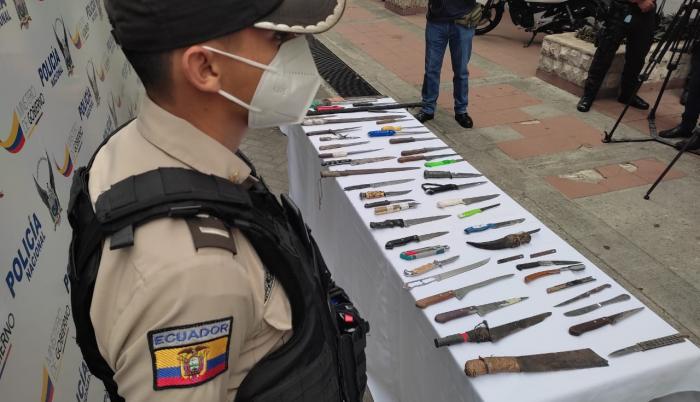RIO DE JANEIRO, BRAZIL – The Ecuadorian capital banned from Thursday the carrying of bladed weapons in public spaces, informed Mayor Santiago Guarderas, in a measure taken in response to the increase in crime linked to drug trafficking in the country, which includes fines for violators.
“It is not going to be possible now in the (metropolitan Quito) district for people to use knives, use screwdrivers, all kinds of weapons that put the safety and life of our inhabitants at risk,” Guarderas said in a video released by the municipality on its Twitter account.
According to councilman Bernardo Abad, people found carrying bladed weapons will be sanctioned with half a basic salary, which in Ecuador is US$425.

The fine will increase to one salary when the offenders are in tourist places, parks, or public transport. The resolution also prohibits the sale and consumption of alcoholic beverages in public places.
Guarderas said that the city council of Quito, the country’s most populous city with some three million inhabitants, is also working on an ordinance to ban the circulation of two people on motorcycles.
It “is the task that the council has to do to reduce the levels of insecurity that Quito is experiencing,” he said.
In 2021, the Ecuadorian capital registered 169 murders, and in the first five months of 2022, 52 have been reported. Robberies rose from 5,069 cases last year to 6,292 so far this year.
Ecuador is facing an increase in criminal violence and drug trafficking. The country closed 2021 with a murder rate of 14 murders per 100,000 people, almost double that of 2020.
For many years, the nation was relatively safe from the violence of neighboring Colombia and Peru, the world’s two largest producers of cocaine. But in recent years, drug seizures have increased.
In 2021 the country seized a record 210 tons of drugs. So far this year, seizures have reached 90 tons, according to the police.
In an attempt to curb violence, the government of President Guillermo Lasso declared on April 30 a state of emergency for 60 days in the coastal provinces of Esmeraldas (northwest and bordering Colombia), Guayas, and Manabi, the hardest hit by drug trafficking and crime, which have left more than 1,200 dead nationwide.
With information from AFP

